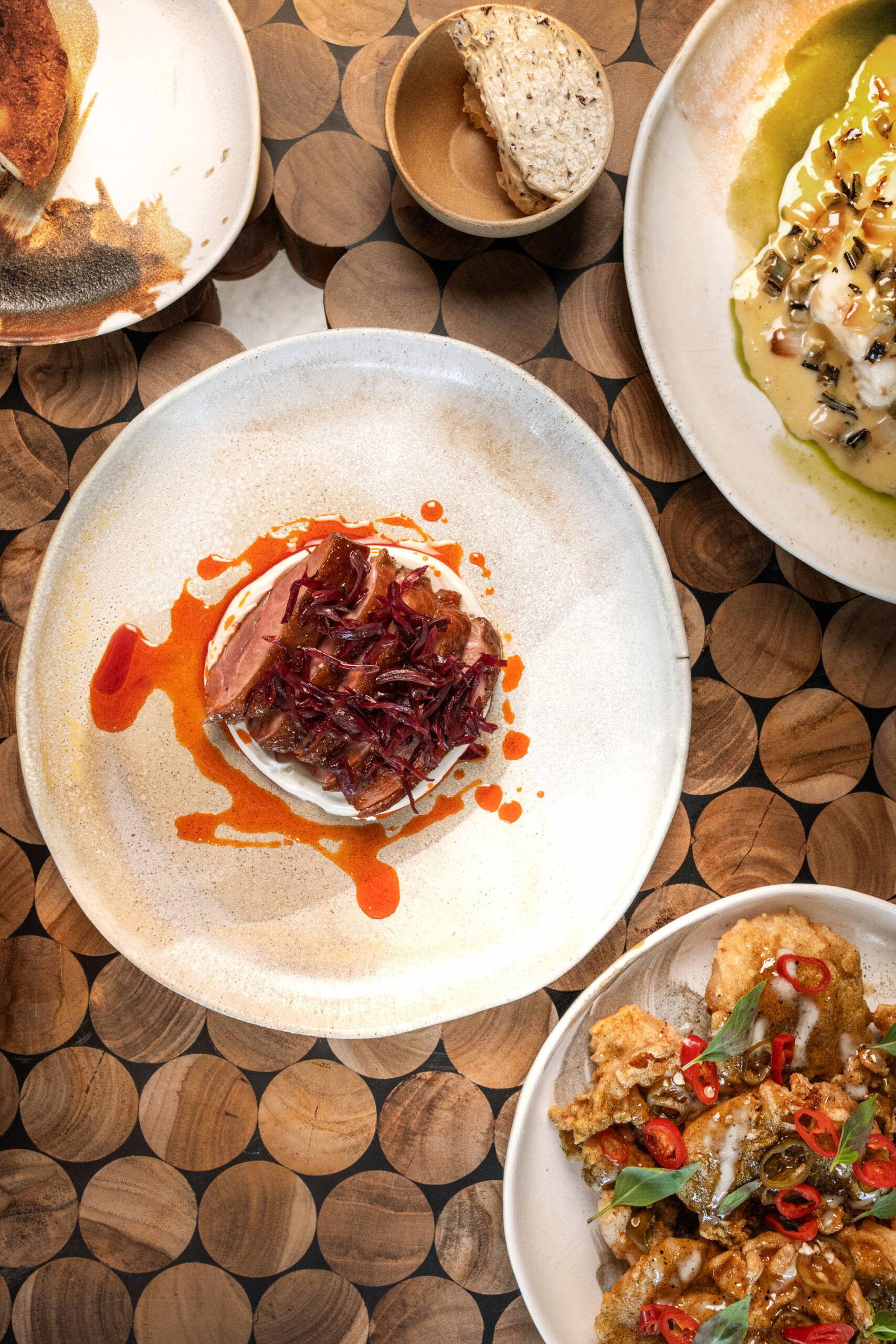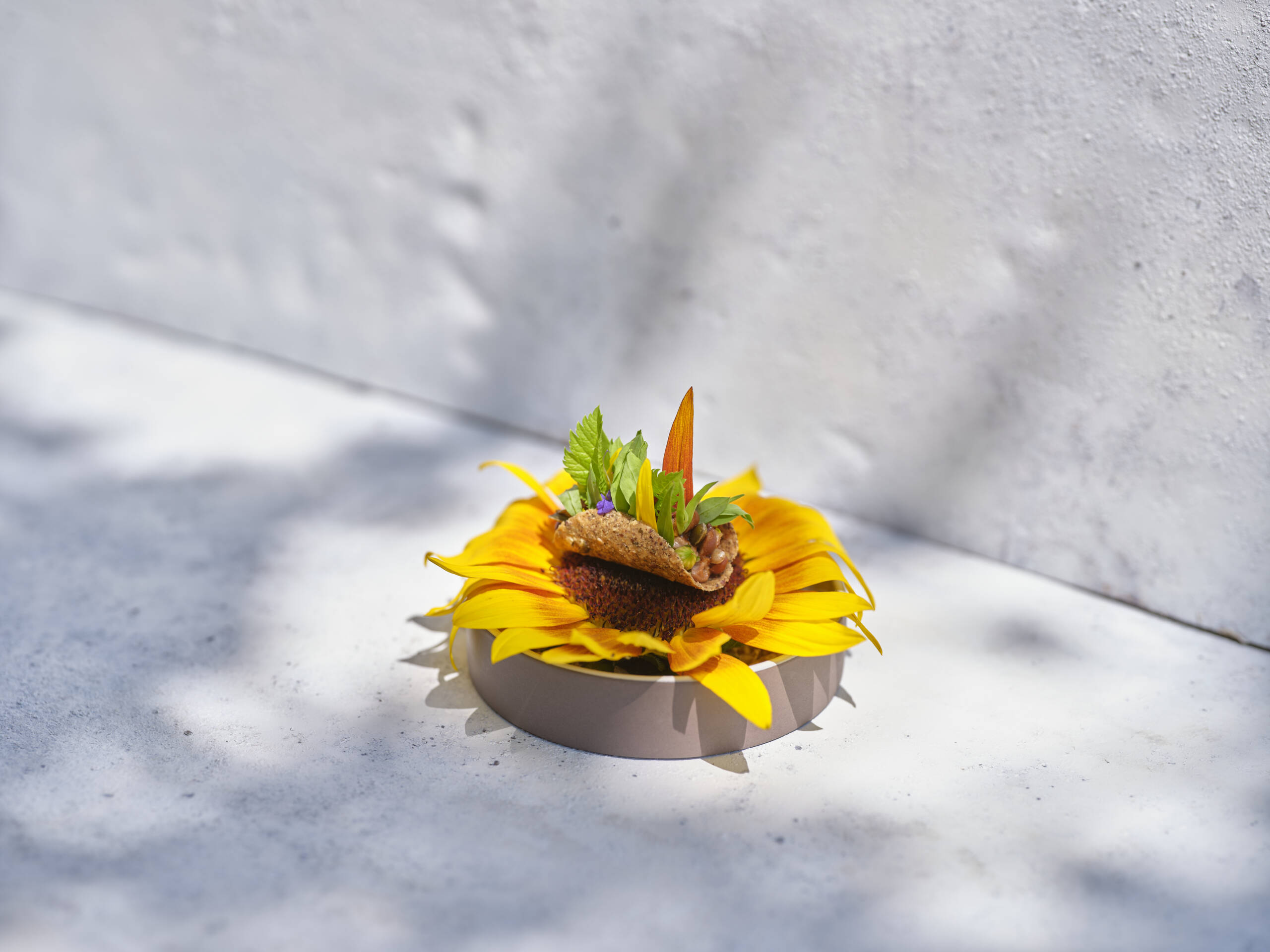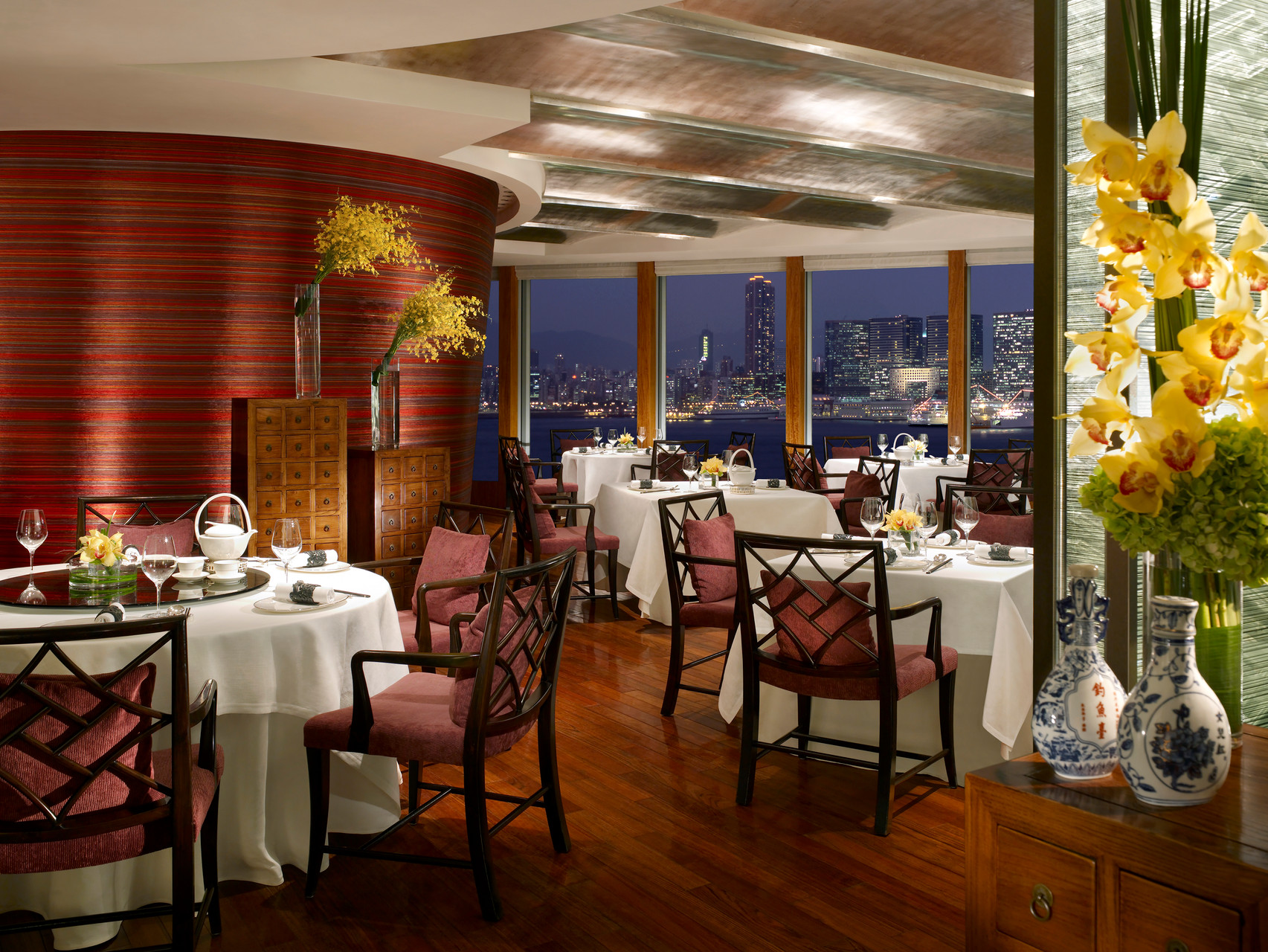
Portrait of Will Goldfarb from Air, Singapore
Some of the world’s most decorated and creative chefs are making environmentally friendly dining the most exciting taste in the world. In the first of a two-part LUX report, Isabella Fergusson talks to three of gastronomy’s finest to find out more
Will Goldfarb from Air, Singapore
With Air (Awareness, Impact, Responsibility), Will Goldfarb (Room4Dessert, Bali) and Matt Orlando (ex Noma, Denmark) are the US power pairing setting taste buds alight with their eco-forward Singapore venture, which opened in January this year.
LUX: Is failure a driver or a hindrance for you?
Will Goldfarb: Failure is a driver, because it just means you didn’t succeed yet.
LUX: You reference art, music and film in your food. Which artists have inspired you recently?
WG: I am a huge MF Doom fan; I think he is a total genius, may he rest in peace. I am particularly inspired by his album Special Herbs and use it in conjunction with our medicinal and healing plants garden during the creative process.

Signature dishes, including a Rozelle Glazed Duck Breast grilled over charcoal
LUX: You moved from Bali to leave pressure behind. Is there more of the same in Singapore?
WG: Singapore is a fascinating and delightful city, and I hope we can showcase some of its unexpected charms.
LUX: How did Bali change your definition of cooking and sustainability?
WG: I think Bali changed my life. And, naturally, it has changed what it means to cook, to share, to be generous and to be creative. The idea of sustainability is very visceral here, it’s not just a slogan.
LUX: Will you be able to maintain the levels of freshness and sustainability in Singapore that you had in Bali?

Night-time at Air, located in a green campus of more than 3,500 square meters
WG: There is no question, having the privilege to witness chef Matt Orlando, that freshness in Singapore will be unparalleled. Take the garden lining the outer perimeter of Air. It’s our little farm, where guests can see the thread of where flavour begins. Every harvest from the garden is destined for the restaurant, with dishes tweaked to absorb the bounty on any given day. As chef Matt said, diners can have one dish today and come back two weeks later to find that the flavours of that same dish may have changed.
LUX: When you came back from El Bulli in Spain, your minimum standard was to be the best in the world. Was this arrogance?
WG: I suppose I think of the above as a statement in humility, not arrogance – in the sense that the best is never enough. I hope that, as I get older, it’s easier to share the more modest side of this constant, steady search for love and wonder in food.
LUX: Is there a young, upcoming chef you admire, especially for how they balance sustainability and creativity?
WG: I am a huge fan of Blanca del Noval. The attention she has been receiving for her work with wild edible plants is very well deserved.

Michelin star chef Ana Roš, whose personal mantra “the way we eat is the way we live” determines her approach to the kitchen
Ana Roš from Hiša Franko, Slovenia
In a mountain valley near an emerald-green river, the restaurant of self-taught former diplomat Roš has three Michelin stars and a Michelin green star. It features local produce, timelessness, ingredients foraged in nature – and Roš’s unique touch.
LUX: What is the most worrying change you have seen recently in relation to sustainability?
Ana Roš: That sustainability is becoming a new word for charity. It is used and abused, with a lot of greenwashing around. We are losing the focus of what sustainability is, in terms of food, the organisation of life, work, timetables, food chains and especially the preservers of traditions and of the future.
LUX: Is greenwashing inevitable? Where can you improve?
AR: I really don’t believe that Hiša Franko is a case of greenwashing. I think that we are clear in emphasising that we do a lot to be sustainable, and can do a lot more to be sustainable. I would not connect greenwashing with our work.

A signature dish at Hiša Franko, comprised of a seeded taco, black sunchoke purée, pears, and silene vulgaris
LUX: What does one’s attitude to food say about one’s attitude to life?
AR: The connection is very obvious. I believe the way we eat is the way we live.
LUX: How do you balance spontaneity and control in the kitchen?
AR: Both parameters are very important. The spontaneous part comes from creativity, but also from observing all of the things that happen in nature. Being spontaneous can create crazy or weird food combinations. Being spontaneous means – since nature is changing all the time – working with the circle of nature. At the same time, that is where control starts being very important. In the kitchen, that means the control of the food process – and exactness.

A view of Hiša Franko, which is set in the Soča Valley, Slovenia, surrounded by nature
LUX: Is there a young chef who has caught your eye who is doing great things for sustainability?
AR: I don’t feel I can say. Most young chefs live in cities, where it is harder to be sustainable than living in the country. Also, you need to know inside the kitchen of chefs to know whether this is greenwashing or real sustainability.

Michelin star chef Chan Yan Tak in the Lung King Heen kitchen at The Four Seasons, Hong Kong
Chan Yan Tak from Lung King Heen, Four Seasons Hotel, Hong Kong
The first Chinese chef to have had a three Michelin-star restaurant, Hong Kong-born Chan Yan Tak combines next-level sustainability practice with an exquisite and creative take on Cantonese cuisine.
LUX: What are your 2024 environmental- awareness plans?
Chan Yan Tak: In line with Four Seasons Hong Kong’s ESG principles, our restaurant is committed to preserving and regenerating the environment and our community. We source most ingredients locally to promote community resilience and reduce carbon emissions from transportation. We offer a range of vegan and vegetarian options, which are refreshed each season. Excess food is donated to the community through Foodlink, a non-profit that works to fight hunger. Food waste is converted offsite into biogas for renewable energy and compost for agriculture. We strive to continue adapting our sustainable programmes while providing exceptional food and services.

An interior view of the restaurant by night, with views of Victoria Harbour beyond
LUX: How have attitudes towards sustainability changed in Chinese gastronomic circles?
CYT: One focus is waste reduction. From this year, the government is banning disposal plastics from in-restaurant dining and takeaways. In fact, our hotel eliminated single-use plastics way before this. Initiatives such as ingredient control, composting and recycling are encouraged, too. It is also essential to provide education to the public and training to employees. People are becoming increasingly environmentally aware, especially with accolades like the Michelin green star, introduced to Hong Kong and Macau in 2021. The topic is more widely discussed, and restaurants are working to explore what can be done better.
LUX: Lung King Heen currently has two Michelin stars. You were also the first Chinese chef to have been awarded three stars. Did these achievements change your approach?
CYT: I don’t think the awards changed the way we cook. The cuisine we create as a team here at Lung King Heen is what earned us this recognition, and we are committed to putting in the same effort every day to ensure that our guests have the best experience.

Signature main dishes at Lung King Heen
LUX: What change do you think we will see in the next five years?
CYT: Sustainability is not just a trend but a reflection of changing values and expectations. People are more conscious of the impact their choices have on the environment and seek eco-friendly products and services. The demand for diverse plant-based or health-conscious options will continue to grow. Next, technology has become integral to our lives, and the dining experience is no exception. AI will play an important role in customer experiences, managing expenses and optimising supply chains. It will be essential to balance technology with human interactions.
LUX: What excites you most about entering the kitchen?
CYT: What excites me the most is simply seeing my team. Our success and accolades are not dependent on one person, it’s about teamwork. I’m proud to say that our restaurant has a low turnover rate. Many team members have been working together for more than 10 years, dedicating themselves to delivering the finest quality food to our guests. I am deeply grateful for their efforts, as they continuously make the impossible possible. Their commitment and passion are the driving forces behind our achievements, and I feel privileged to be a part of such an exceptional team.





